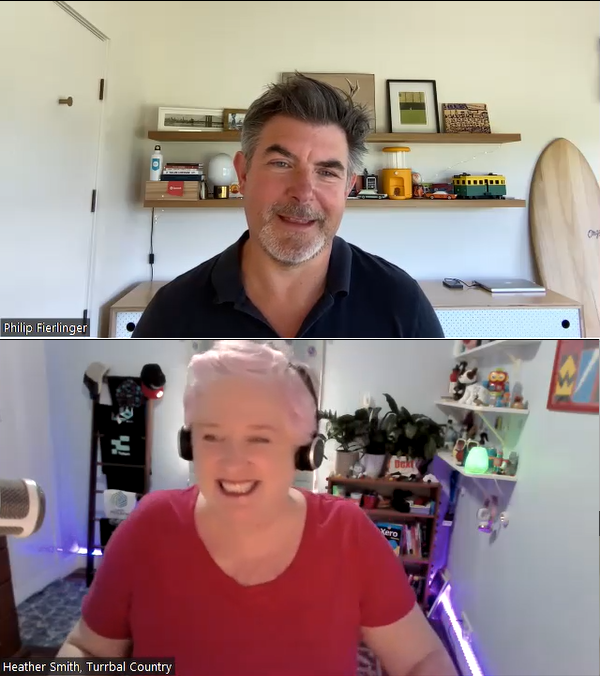“Accounting software should not be about the purpose of accounting software. It shouldn’t be about paying taxes. It should be about running your business. And so if cash is the most important thing you need to understand about your business, you need to have as close to real-time visibility on your cash as possible”.
– Philip Fierlinger, Co-Ceo of UpStock
Xero co-founder Philip Fierlinger shares the story behind building one of the world’s most successful accounting platforms, Xero He discusses his early inspiration from car dashboards and the gamification of bank reconciliations. Fierlinger also reveals how his latest startup Upstock is transforming the inefficient B2B food ordering process and levelling the playing field for small suppliers.
Many of our listeners will know Philip Fierlinger as one of the 5 co-founders of Xero, but let me share with you a bit of background about Philip:
For over 5 years, Philip has been creating digital products and experiences that have set new standards of design, business and technology.
In 1992, a university project landed Philip an internship at General Magic where he conceptualised the “Mediaphone” a digital walkman, letting you download music anywhere, anytime. To give you some context this was 9 years before Steve Jobs introduced the iPod and 15 years before Jobs introduced the iPhone.
Philip went on to create a digital agency, with his brother in 1994, doing work for Apple, the Beastie Boys, Comcast, Disney, Dreamworks, Macromedia, Palm, and Sony Playstation, among many others.
After moving to NZ, Philip co-founded Xero in 2006, where he was Head of Design for nearly 10 years. Philip was instrumental in Xero becoming a disruptive platform, an iconic global brand, and a market-leading public company worth billions of dollars. And I suspect as he had a focus on design, he had something to do with making Xero beautiful software.
Philip is currently co-CEO of Upstock, a B2B wholesale platform that’s transforming the way the food service industry operates.
Along the way, Philip has been an investor and advisor to numerous startups and scaleups including Sharesies, Milanote, Deputy, Atomic, Karbon, and Chartio (sold to Atlassian) – helping with product, marketing, growth, team & culture, and investor strategy.
Got a packed schedule? Now you can get your CPE credits while you’re on the go! Tune in to my podcast on Earmark and earn NASBA-approved CPE or IRS-approved CE—just by listening. It’s that simple. Head to my Earmark CPE channel, register and launch the course.
Don’t miss the details at the end of this blog to learn more about Earmark CPE. Now, let’s dive into this episode! 🎧

In this episode, I talk to Philip Fierlinger Co-Ceo of UpStock.app about . . .
- Career journey from car design to tech entrepreneurship.
- Xero’s history, developing an accounting system with a focus on bank feeds and beautiful design.
- Prioritising business operations over tax compliance with real-time cash flow visibility.
- How a three-year-old inspired the innovative design of Xero
- Launching a food service marketplace, digitising B2B transactions.
- The business model and pricing for a B2B marketplace.
- Streamlining food service industry operations with the UpStock platform.
- A platform for farmers and suppliers to connect and grow their businesses.
Summary of the interview
We talked about:
- Career journey from car design to tech entrepreneurship.
- Philip Fierlinger’s interest in design and technology began when he was 16 and realised he was better at building things with computers than with his hands.
- In 2006, Philip co-founded Xero with friends, leveraging his expertise in digital technology and product design to create a cloud-based accounting software platform.
- Developing an accounting system with a focus on bank feeds and beautiful design.
- Rod Drury, a prolific entrepreneur and blogger, inspired Philip with his startup idea and offered to help with a pitch deck.
- Philip and Rod discussed the potential for an accounting system that could import data from banks, which Philip thought was challenging but Rod was confident about in New Zealand.
- Philip discussed the development of the platform with business owners, bookkeepers, and accountants, mapping out the inputs and outputs of the system with sticky notes on the wall.
- Co-founder and CTO Craig Walker studied the sticky notes on the wall, stating that they represented a better data schema and required re-engineering of the whole database.
- Prioritising business operations over tax compliance with real-time cash flow visibility.
- Philip highlights the challenge of cash flow management for small businesses, emphasising the importance of real-time visibility into cash flow.
- Philip proposes flipping the traditional accounting software approach, prioritising business operations over tax compliance, to improve cash flow management and overall business success.
- Philip reflects on their experience with accounting software, realising that people hate dealing with bookkeeping and aims to inject fun into the process.
- How a three-year-old inspired the innovative design of Xero
- Philip compares the process of matching transactions in accounting software to the game of Memory with his 3-year-old son, highlighting the addictive nature and dopamine hit of finding matching pairs.
- Philip demonstrated a bank reconciliation tool to Craig and Rod, which they found impressive but also had doubts about its usability and feasibility.
- The tool was redesigned to rely on people getting statements, and user testing showed that it could automate bank reconciliation tasks with ease.
- Philip shared a magical moment when a client said they would rather do a root canal without anaesthesia than do bank reconciliation. And he said, however, now that I’ve used Xero, it’s fun, and I look forward to it and I’m disappointed when it’s done, indicating Xero is a game-changing experience.
- There was resistance from accountants in the early days, with some pretending it wouldn’t work as it would reduce their billable hours, while small businesses were enthusiastic and pushed for its use.
- Philip talked about Shifting the accounting industry focus from billing by the hour to value-added collaboration.
- Launching a food service marketplace.
- UpStock is a food service marketplace and logistics platform, and co-CEO Philip shares the backstory of the company’s emergence.
- Digitising BB transactions in various industries.
- Philip describes a problem with misunderstandings and miscommunications in businesses, leading to frustration and waste.
- About seeking advice on how to solve this problem, considering software solutions for e-commerce transactions between buyers and sellers.
- On business owners struggling with manual inventory management, having limited software options, and hearing from customers about chaotic ordering processes.
- Philip identifies a glaring problem in the B2B industry and sees a massive opportunity for digital transformation.
- Business model and pricing for a B2B marketplace.
- How the pandemic helped their business, Upstart, by creating a need for digital solutions and remote work.
- Competitors in the logistics industry, mentioning a freemium model that connects buyers and suppliers, with premium plans for both sides.
- Highlighting the uniqueness of their business model and pricing approach, which includes a $30 monthly SaaS subscription fee for a Marketplace plan.
- The platform offers free exposure and promotion for brands, with the option to upgrade to full end-to-end functionality for $30/month.
- The platform automates order handling, payment processing, and invoicing, streamlining the process for suppliers and buyers.
 Streamlining food service industry operations with the UpStock platform.
Streamlining food service industry operations with the UpStock platform.
- Suppliers can manage their entire catalogue and pricing in one place with Upstock, eliminating the need for manual updates and ensuring accurate pricing for customers.
- With Upstock, suppliers can reach new customers and expand into new regions and customer segments, leading to increased market share and revenue growth.
- The benefits of Upstock for accountants and bookkeepers, including streamlined ordering and invoicing, reduced errors, and potential growth for clients.
- Philip notes that Upstock is easy to get started with, with some customers setting up within 4 hours and the potential to be live and taking orders within an hour.
- Streamlining order management for small businesses.
- Philip criticises competitors for charging excessive setup fees and commission fees, emphasising the fairness and transparency of their own pricing model.
- Supplier platform aims to level the playing field for small businesses by streamlining order management and reducing time spent on administrative tasks.
- A platform for farmers and suppliers to connect and grow their businesses.
- The unique features of the platform, including the ability for suppliers to choose whether or not to display prices and the importance of building a relationship with buyers before providing pricing information.
- Frustration with competitors who prioritise their own profits over the success of their suppliers and customers, and who use the platform as a price comparison tool.
- The demand for Upstock.app in the US market, is driven by customers and suppliers.
- Listeners in the finance and accounting advisory world should seek expert advice on software integration, rather than relying on general recommendations.
- Wrapping up
- Philip loves reading biographies of musicians and comedians and recommends Eric Idle’s memoir Always Look on the Bright Side of Life: A Sortabiography for its hilarious stories and name drops.
- Connect with him here: https://www.linkedin.com/in/fierlinger/
Thanks for listening to that interview. Funnily enough, after speaking with Philip I jumped on to deliver a webinar on Financial Apps to Help your Startup to female founders as part of the Launch Y(E)P Young Entrepreneurs Program specifically their Incubate program. One of the founders sells Kiss Tea which is Sparkling Cold Brew Tea. Along with the typical financial apps I recommended she take a look at UpStock.app and guess what she was already using and loving it. I’ll pop a link to her page on UpStock.app on the show notes: https://www.upstock.app/wholesalers/kiss-teas
Earmark CPE is registered with the National Association of State Boards of Accountancy (NASBA) as a sponsor of continuing professional education on the National Registry of CPE Sponsors. State boards of accountancy have final authority on the acceptance of individual courses for CPE credit. Complaints regarding registered sponsors may be submitted to the National Registry of CPE Sponsors through its website: www.NASBARegistry.org.





 Streamlining food service industry operations with the UpStock platform.
Streamlining food service industry operations with the UpStock platform.